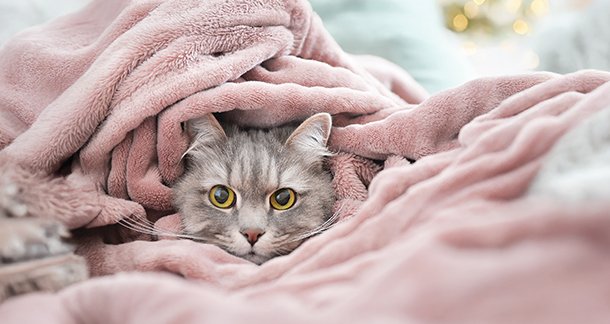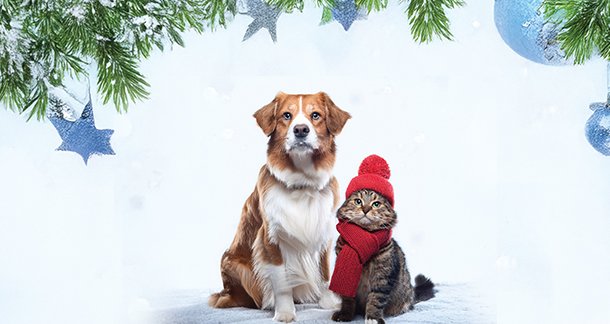As the winter chill sets in, our beloved furry friends, also feel the effects of the dropping temperatures. Winter can lead to a host of issues, including dry skin, joint stiffness, and even hypothermia in extreme cases. Cats and dogs may also struggle with reduced activity levels due to the cold, leading to potential weight gain or pent-up energy. Additionally, cold weather often exacerbates pre-existing conditions like arthritis, particularly in older pets. While their fur provides some level of protection, they still rely on us to keep them safe, warm, and healthy during this season. It is essential to take proactive steps to address these challenges and ensure your pets remain comfortable, healthy, and happy throughout the winter months.
The importance of proper nutrition in winter
Winter is a time when pets expend extra energy to stay warm. This means their nutritional needs may increase, particularly if they spend time outdoors. The right nutrition not only provides warmth but also supports their immune system to ward off seasonal illnesses. Dogs and cats need a diet rich in high-quality proteins and fiber to maintain muscle strength, support digestion and energy levels. Healthy fats, like omega-3 and omega-6 fatty acids, are essential for providing extra warmth and supporting a healthy coat, which acts as a natural barrier against the cold. Vitamins such as A, D, and E, along with minerals like zinc and selenium, boost their immune system, helping them fight off seasonal illnesses. Hydration is also crucial, as pets often drink less in winter, which can lead to dry skin and other health issues.
Additionally, it is also recommended to include packaged pet food to ensure your furry companions receive all the essential nutrients in the right proportions. These diets are formulated by experts, ensuring they meet the unique dietary needs of dogs and cats, whether they’re active outdoor pets or cozy indoor companions.

Keeping pets warm and comfortable
Keeping pets warm and comfortable during winter is essential to their health and well-being. Indoors, provide insulated bedding to shield them from cold floors. Raised beds work well for dogs, while cozy hideouts are ideal for cats to stay warm. It is equally important to maintain a comfortable room temperature and avoid placing their beds near windows or doors where chilly air might seep through. For pets who enjoy the outdoors, limit their time outside during extreme cold and ensure they are equipped with protective clothing like sweaters for dogs. After walks, clean their paws to prevent frostbite or exposure to harmful chemicals.
The importance of hydration
Proper hydration during winter is often an overlooked factor. In colder months, pets might drink less water than usual, increasing their risk of dehydration. Always ensure fresh water is available, and consider a pet water fountain to encourage hydration, especially for cats. Packaged pet food can also help as it often contains balanced moisture levels, particularly in wet food varieties.
Exercise and mental stimulation
Winter weather can limit outdoor play, but keeping pets physically and mentally active is essential to prevent weight gain and ensure their well-being. Indoors, engage them with interactive toys like treat puzzles and feather wands to stimulate their minds, and incorporate short play sessions to keep them active and entertained. If the weather allows, bundle your dog in a sweater or jacket and opt for shorter walks during the warmest part of the day. For cats, supervised outdoor time in a secure area can also provide valuable enrichment. By balancing indoor and outdoor activities, you can keep your pets fit, engaged, and happy throughout the winter months.
Grooming for winter
Grooming is just as important in winter as it is in warmer months. Regular brushing helps remove dead fur and prevents matting, which can trap cold air close to the skin, keeping your pet warmer. Additionally, paw care is crucial and it is important to regularly check and moisturize your dog’s paws to prevent cracking from the cold and exposure to salt or de-icing chemicals. These simple grooming habits ensure your pets stay comfortable and protected during the winter season.

Winter-specific health concerns
Winter brings specific health concerns for pets, including hypothermia and frostbite, especially in smaller breeds, older pets, or those with short fur. Watch for signs like shivering, lethargy, or pale extremities. Just like humans, pets can catch seasonal colds, so boosting their immunity with proper nutrition and regular check-ups is essential. For older pets with arthritis, the cold can worsen joint pain, so providing warm bedding and considering joint supplements or therapeutic diets can help manage their discomfort. Keeping a close eye on these winter-specific issues will ensure your pet stays healthy and comfortable during the colder months.
Winter care for pets goes beyond keeping them warm; it is about ensuring their overall well-being through proper nutrition, hydration, exercise, and comfort. With just a little extra effort, you can make this winter a cozy, joyful time for your pets.

